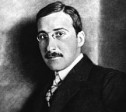Stefan Zweig

Stefan Zweig (German: [tsvaɪk]; November 28, 1881 – February 22, 1942) was an Austrian novelist, playwright, journalist and biographer. At the height of his literary career, in the 1920s and 1930s, he was one of the most popular writers in the world. Zweig was born in Vienna, the son of Moritz Zweig (1845–1926), a wealthy Jewish textile manufacturer, and Ida Brettauer (1854–1938), a daughter of a Jewish banking family. He was related to the Czech writer Egon Hostovský, who described him as "a very distant relative"; some sources describe them as cousins. Zweig studied philosophy at the University of Vienna and in 1904 earned a doctoral degree with a thesis on "The Philosophy of Hippolyte Taine". Religion did not play a central role in his education. "My mother and father were Jewish only through accident of birth", Zweig said later in an interview. Yet he did not renounce his Jewish faith and wrote repeatedly on Jews and Jewish themes, as in his story Buchmendel. Zweig had a warm relationship with Theodor Herzl, the founder of Zionism, whom he met when Herzl was still literary editor of the Neue Freie Presse, then Vienna's main newspaper; Herzl accepted for publication some of Zweig's early essays. Zweig believed in internationalism and in europeanism; Herzl's Jewish nationalism could not therefore have had much attraction, as The World of Yesterday, his autobiography, makes clear. The Neue Freie Presse did not review Herzl's Der Judenstaat. Zweig himself called Herzl's book an "obtuse text, [a] piece of nonsense".
 čeština
čeština Deutsch
Deutsch français
français magyar
magyar polski
polski русский
русский English
English Azərbaycan
Azərbaycan беларуская
беларуская italiano
italiano ქართული
ქართული қазақ
қазақ Nederlands
Nederlands português
português slovenčina
slovenčina 中文
中文 español
español




























